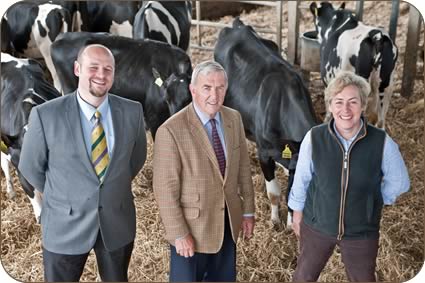Jennifer MacKenzie is an agricultural photo journalist with almost 30 year's experience. Operating from her base in Cumbria, Jennifer undertakes mainly industry-related freelance writing and photography.
Dairy Cows return to Newton Rigg
When York-based Askham Bryan College’s Liz Philip and her team made
their pitch to take over Newton Rigg College, Penrith, in December 2010
they pledged they would bring back the dairy cows.
The merger of the colleges in August 2011 and with
progress at Newton Rigg under principal Wes Johnson far exceeding expectations,
that commitment to the £1.9 million investment is beginning to come
to fruition.
 |
| left to right, Newton Rigg Campus principal Wes Johnson, Newton Rigg governors' chairman Alan Bowe and chief executive Liz Philip with Holstein heifers at Sewborwens. |
Full planning permission has been granted for a state of the art 250-cow
unit on a greenfield site at the college’s Sewborwens Farm, tenders
have gone out for the work, the college is in the initial stages of applying
for a grant from Defra - and dairy cattle are arriving.
“Dairying has always been key to our plans for Newton Rigg,” said
chief executive Mrs Philip. “The Cumbrian agricultural community
was indignant that its college had turned its back on dairying after 2001’s
foot and mouth epidemic which continues to fuel emotion.
“It’s fundamental and goes right back to the reason land-based
colleges began. It was to feed the nation which is a hugely important task.
When you consider that 80% of the population drink milk in some form every
day, not to invest in dairying was wrong.”
Embarking on a project of such scale - the £1.9 million includes
investment in the dairy cattle as well as the building and fitting out
the new dairy unit - has not been undertaken lightly and Mrs Philip has
had the backing of the Askham Bryan board of governors as well as those
at Newton Rigg, chaired by Alan Bowe.
Also pivotal to the new plans is the knowledge and involvement of Newton
Rigg farm manager, a former dairy farmer and pedigree dairy cattle breeder,
Jonathan Fisher.
Valuable input has come from hands-on dairy farmers in the county - in
particular, Peter Holliday, of Dobcross Hall, Dalston, and Kevin Wilson,
of Wood Farm, Thursby and vet David Black, of Paragon, Dalston, who are
ensuring the unit will have maximum cattle comfort and minimise disease.
The plans are for two adjacent new buildings at Sewborwens - one a cubicle
house with the other housing the parlour, handling and teaching facilities,
dry cows and those needing extra supervision.
Observation galleries are planned and the unit will incorporate the latest
environmental technology, including solar panels and rainwater collection.
The facilities will provide the highest standards of teaching for the next
generation of dairy farmers as well as a showcase for the farming community
in general.
“The timing of the dairy unit is quite difficult. We would like to
get on with it now but we can’t progress until we have had our application
for grant to Defra appraised but our aim is to get cattle into the new
housing by the spring of next year,” said Mrs Philip. She emphasised
that while the unit would be run commercially and sustainably it would
also be a project of national significance.
While significant investment both financially in facilities and in enabling
the recovery of Newton Rigg has been made over the last 12 months, the
portfolio at Askham Bryan has been added to with the purchase of the 340-acre
Askham Richard farm.
The total acreage farmed between both colleges is 2,400 acres and once
the Newton Rigg dairy herd is re-established 460 cows will be milked on
the two sites, there will be 1,400 ewes representing the spectrum of the
stratified sheep system, 135 beef cattle and an arable operation offering
a wide diversity of educational opportunity for students by sharing these
resources.
The revitalisation of Newton Rigg has attracted huge support from the local
community and agri-industry and, in turn, full-time student recruitment
is up by 33% for the academic year starting in September - an anticipated
growth of 50% by 2013.
Two key subjects have been agriculture and forestry. Recruitment on agriculture
courses has increased by 315% and forestry, which has been lacking a further
education facility for nine years, has attracted a strong student intake.
The college’s target for 2011-12 for students the college receives
grant on, was 1,500, however the recruitment is 250 more and this will
have positive implications for funding next year. In 2007 the grant was
for only 450 students.
Turnover in 2007 was £9.5 million, now it is £25.8 million,
quite an achievement for a public sector organisation in a recession.
The college has moved up from a grade 4 in 2009 to a grade 2 Ofsted inspection,
one of only five colleges out of 49 further education establishments to
achieve such an improvement in the current inspection cycle which Mrs Philip
acknowledges is a huge credit to the staff who have been very flexible
during the changes.
On the back of this ‘juggernaut’, as Mrs Philip calls it, Newton
Rigg and Askham Bryan jointly have 81 jobs to fill, 36 of which are new
roles.
Other highlights of the year have included:
• An inaugural grassland event, Grassland North, organised in conjunction
with agricultural machinery experts Carrs Billington, which attracted 3,500
people.
• The re-launch of the Newton Rigg Society, spearheaded by former
lecturer John Rigg, of Penrith, which attracted 90 people to its first
lunch at the college.
• A spring countryside day for the general public which brought
crowds of around 2,000 through the gates.
While the new dairy unit will be a major milestone for Newton Rigg, plans
are already under way to create a National Centre for the Uplands at the
college’s hill farm, Low Beckside, Mungrisdale, in the Lake District
National Park.
The college has been successful in its bid to the Prince’s Countryside
Fund which will enable the plans to be progressed. Former college head
of agriculture and now a governor, Andrew Humphries has been instrumental
in these plans.
Now the college is looking to appoint a director for the centre and has
employed a new uplands agricultural lecturer Paul Flynn who will be developing
a foundation degree and working closely with Mr Humphries on the centre.
In the summer of 2013, some buildings no longer fit for purpose on the
main site will be demolished and the site re-developed to further improve
the quality of resources.

